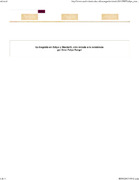Mostrar el registro sencillo del ítem
La tragedia en Edipo y Macbeth
| dc.contributor.author | Rangel, Omar Felipe | spa |
| dc.date.accessioned | 2020-10-27T00:09:20Z | |
| dc.date.available | 2020-10-27T00:09:20Z | |
| dc.date.issued | 2007 | |
| dc.identifier.issn | 2145-7190 | |
| dc.identifier.uri | http://hdl.handle.net/20.500.12749/8714 | |
| dc.description.abstract | La pasión del hombre por el hombre, por esa disonancia hecha carne, ha abierto en algunas soledades profundas heridas y fluyentes manantiales. A través de los tiempos el hombre ha agotado las palabras tratando de desenredar la telaraña de lo humano, acaso enredándola más, a caso pereciendo enredado. En la construcción de nuestra imagen del alma han intervenido todo tipo de arquitectos y de arquitecturas. Las distintas culturas han creado una idea del hombre que refleja su espíritu, sus fisuras y paradojas, así como sus más grandes anhelos. Sófocles y Shakespeare son dos de los más importantes paradigmas de la arquitectura humana, símbolo de sus culturas al tiempo que iluminados intempestivos. Estos hombres han esculpido y retratado como pocos la forma y el gesto propios de su época. Han despojado las palabras del compromiso con la verdad haciendo un uso más honesto, más humano de ideas como el destino y la libertad para darle vida a dos de sus personajes, Edipo y Macbeth. Estos héroes son dos caras, dos visiones de lo que el hombre tiene por decir de las fuerzas del universo y de las fuerzas que en su interior habitan, de lo que nos está permitido pensar y hacer dentro de las posibilidades de nuestra existencia y en la búsqueda de un propósito para la misma. | spa |
| dc.format.mimetype | application/pdf | spa |
| dc.language.iso | spa | spa |
| dc.publisher | Universidad Autónoma de Bucaramanga UNAB | |
| dc.relation | https://revistas.unab.edu.co/index.php/laterceraorilla/article/view/3094/2587 | |
| dc.relation.uri | https://revistas.unab.edu.co/index.php/laterceraorilla/article/view/3094 | |
| dc.rights.uri | http://creativecommons.org/licenses/by-nc-nd/2.5/co/ | |
| dc.source | La Tercera Orilla; Núm. 1 (2007) | |
| dc.subject | Ciencias sociales | |
| dc.subject | Publicaciones seriadas | |
| dc.subject | Investigaciones | |
| dc.subject | Arte y cultura | |
| dc.subject | Literatura | |
| dc.title | La tragedia en Edipo y Macbeth | spa |
| dc.title.translated | The tragedy in Oedipus and Macbeth | eng |
| dc.type.driver | info:eu-repo/semantics/article | |
| dc.type.local | Artículo | spa |
| dc.type.coar | http://purl.org/coar/resource_type/c_7a1f | |
| dc.subject.keywords | Social sciences | eng |
| dc.subject.keywords | Serials | eng |
| dc.subject.keywords | Investigations | eng |
| dc.subject.keywords | Art and culture | eng |
| dc.subject.keywords | Literature | eng |
| dc.identifier.instname | instname:Universidad Autónoma de Bucaramanga UNAB | spa |
| dc.type.hasversion | Info:eu-repo/semantics/publishedVersion | |
| dc.type.hasversion | info:eu-repo/semantics/acceptedVersion | spa |
| dc.rights.accessrights | info:eu-repo/semantics/openAccess | spa |
| dc.subject.lemb | Ciencias sociales | spa |
| dc.subject.lemb | Seriales | spa |
| dc.subject.lemb | Investigaciones | spa |
| dc.subject.lemb | Arte y Cultura | spa |
| dc.subject.lemb | Literatura | spa |
| dc.identifier.repourl | repourl:https://repository.unab.edu.co | |
| dc.description.abstractenglish | The passion of man for man, for that dissonance made flesh, has opened deep wounds in some solitudes and flowing springs. Through the ages, man has exhausted words trying to untangle the web of what human, perhaps entangling it more, perhaps perishing entangled. Everything has been involved in the construction of our image of the soul. type of architects and architectures. Different cultures have created an idea of man that reflects his spirit, his fissures and paradoxes of him, as well as his greatest longings. sophocles and Shakespeare are two of the most important paradigms of the human architecture, symbol of their cultures while untimely illuminations. These men have sculpted and portrayed like few others the form and gesture typical of his time. They have stripped words of commitment to truth by making a more honest, more humane use of ideas like fate and freedom to give life to two of his characters, Oedipus and Macbeth. These heroes are two faces, two visions of what man has to say of the forces of the universe and of the forces that in their interior they inhabit, of what we are allowed to think and do within of the possibilities of our existence and in the search for a purpose for it. | eng |
| dc.type.redcol | http://purl.org/redcol/resource_type/ART |
Ficheros en el ítem
Este ítem aparece en la(s) siguiente(s) colección(ones)
-
Revista Tercera Orilla [259]


